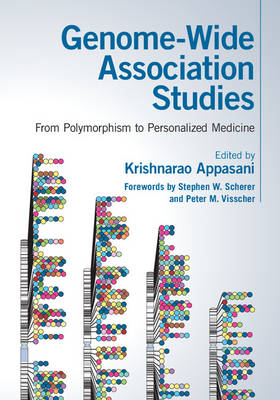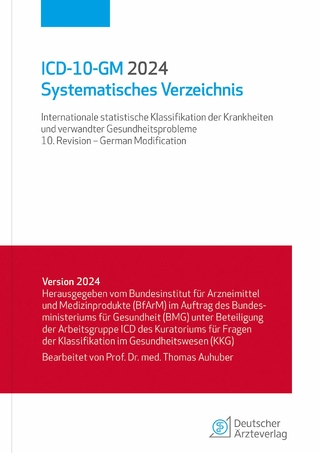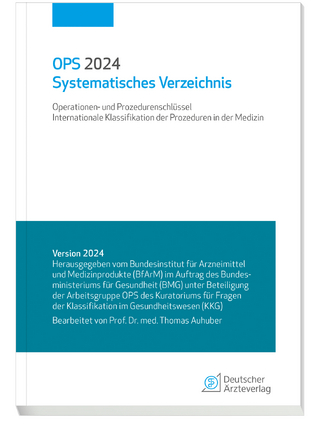
Genome-Wide Association Studies
Cambridge University Press (Verlag)
978-1-107-04276-6 (ISBN)
Over the last twenty years, genome-wide association studies (GWAS) have revealed a great deal about the genetic basis of a wide range of complex diseases and they will undoubtedly continue to have a broad impact as we move to an era of personalised medicine. This authoritative text, written by leaders and innovators from both academia and industry, covers the basic science as well as the clinical, biotechnological and pharmaceutical potential of these methods. With special emphasis given to highlighting pharmacogenomics and population genomics studies using next-generation technology approaches, this is the first book devoted to combining association studies with single nucleotide polymorphisms, copy number variants, haplotypes and expressed quantitative trait loci. A reliable guide for newcomers to the field as well as for experienced scientists, this is a unique resource for anyone interested in how the revolutionary power of genomics can be applied to solve problems in complex disease.
Krishnarao Appasani is the Founder and Chief Executive Officer of GeneExpression Systems, a global conference-producing organization focusing on biomedical and physical sciences. He is an award-winning scientist and the editor of Epigenomics: From Chromatin Biology to Therapeutics (2012), MicroRNAs: From Basic Science to Disease Biology (2007) and RNA Interference: From Basic Science to Drug Development (2005), all published by Cambridge University Press.
List of contributors; Foreword Stephen W. Scherer; Foreword Peter M. Visscher; Preface; Part I. Genome-Wide Association Studies: 1. Introduction to genome-wide association Krishnarao Appasani and Raghu K. Appasani; 2. GWAS: a milestone in the road from genotypes to phenotypes Urko Martinez-Marigorta, Juan Antonio Rodriguez and Arcadi Navarro; 3. Introduction to statistical methods in genome-wide association studies Can Yang, Cong Li, Dongjun Chung, Mengjie Chen, Joel Gelernter and Hongyu Zhao; 4. GWAS replicability across time and space Urko Martinez-Marigorta, Juan Antonio Rodriguez and Arcadi Navarro; Part II. Genome-Wide Studies in Disease Biology: 5. Genome-wide association studies of body mass index Tuomas O. Kilpelainen; 6. Identification of myocardial infarction susceptible genes and their functional analyses Kouichi Ozaki and Toshihiro Tanaka; 7. Admixture mapping for disease gene discovery Randall C. Johnson, Cheryl A. Winkler and Meredith Yeager; 8. Genome-wide association analysis in schizophrenia Sven Stringer, Dorien H. Nieman, René S. Kahn and Eske M. Derks; 9. Epigenome-wide association studies in neurodevelopmental disorders Takeo Kubota, Kunio Miyake and Takae Hirasawa; Part III. Single Nucleotide Polymorphisms, Copy Number Variants, Haplotypes and eQTLs: 10. Finding SNPs that affect microRNA regulation in disease-associated genomic regions Laurent F. Thomas and Pal Saetrom; 11. From linkage to complex associations: the role of GABRA2 as a risk factor for alcohol use Sandra Villafuerte, Elisa M. Trucco and Margit Burmeister; 12. Copy number variation in monozygous twins Erwin Brosens, K. G. Snoek, D. Veenma, H. Eussen, D. Tibboel and A. de Klein; 13. Haplotypes of CpG-related SNPs and association with DNA methylation patterns Yiyi Ma, Caren E. Smith, Yu-Chi Lee, Laurence D. Parnell, Chao-Qiang Lai and José M. Ordovás; 14. eQTL mapping Mengjie Chen, Can Yang, Cong Li and Hongyu Zhao; Part IV. Next-Generation Sequencing Technology and Pharmacogenomics: 15. Next-generation sequencing for rare diseases Elena Bosch and Ferran Casals; 16. Next-generation sequencing for complex disorders Ferran Casals and Elena Bosch; 17. Chromosomal breakpoints in breast cancer co-localize with differentially methylated regions Man-Hung Eric Tang, Vinay Varadan, Sitharthan Kamalakaran, Michael Q. Zhang, James Hicks and Nevenka Dimitrova; 18. Signaling network analysis of genomic alterations predict breast cancer drug targets Naif Zaman and Edwin Wang; 19. Pharmacogenetic studies in pediatric acute myeloid leukemia Neha S. Bhise, Lata Chauhan and Jatinder K. Lamba; 20. Pharmacogenomics of antiretroviral drugs Chonlaphat Sukasem, Apichaya Puangpetch and Sadeep Medhasi; Part V. Population Genetics and Personalized Medicine: 21. Population stratification and its implications: lessons from genome-wide studies Sheikh Nizamuddin, Rakesh Tamang and Kumarasamy Thangaraj; 22. How to solve genetic disease on a population scale Barry Merriman; 23. Economics of personalized medicine Katherine Payne and Martin Eden; Index.
| Vorwort | Stephen W. Scherer, Peter M. Visscher |
|---|---|
| Zusatzinfo | 24 Tables, black and white; 26 Plates, color; 54 Halftones, unspecified; 13 Line drawings, unspecified |
| Verlagsort | Cambridge |
| Sprache | englisch |
| Maße | 180 x 254 mm |
| Gewicht | 1050 g |
| Themenwelt | Mathematik / Informatik ► Informatik ► Theorie / Studium |
| Informatik ► Weitere Themen ► Bioinformatik | |
| Naturwissenschaften ► Biologie ► Genetik / Molekularbiologie | |
| ISBN-10 | 1-107-04276-3 / 1107042763 |
| ISBN-13 | 978-1-107-04276-6 / 9781107042766 |
| Zustand | Neuware |
| Haben Sie eine Frage zum Produkt? |
aus dem Bereich


